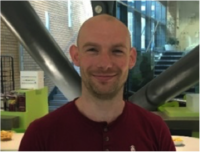CAZypedia celebrates the life of Senior Curator Emeritus Harry Gilbert, a true giant in the field, who passed away in September 2025.
CAZypedia needs your help!
We have many unassigned pages in need of Authors and Responsible Curators. See a page that's out-of-date and just needs a touch-up? - You are also welcome to become a CAZypedian. Here's how.
Scientists at all career stages, including students, are welcome to contribute.
Learn more about CAZypedia's misson here and in this article. Totally new to the CAZy classification? Read this first.
Difference between revisions of "User:Alan Cartmell"
| (10 intermediate revisions by 2 users not shown) | |||
| Line 1: | Line 1: | ||
| − | [[Image: | + | [[Image:AlanCartmell.png|thumb|200px|right]] |
| − | Alan Cartmell did his B.Sc. in Biochemistry at Newcastle University and then completed both an M.Res and Ph.D under the supervision of Professor Harry Gilbert. The work during his doctoral studies focused on structure/function studies of novel glycoside hydrolases from GH26, GH43 and GH124 families. He then undertook a two year postdoctoral fellowship at the La Jolla institute for Allergy and Immunology in the laboratory of Professor Dirk Zajonc. The position was funded by a juvenile diabetes research foundation junior postdoctoral fellowship and | + | Alan Cartmell did his B.Sc. in Biochemistry at Newcastle University and then completed both an M.Res and Ph.D under the supervision of Professor [[User:Harry Gilbert|Harry Gilbert]]. The work during his doctoral studies focused on structure/function studies of novel glycoside hydrolases from [[GH26]], [[GH43]] and [[GH124]] families. He then undertook a two year postdoctoral fellowship at the La Jolla institute for Allergy and Immunology in the laboratory of Professor Dirk Zajonc. The position was funded by a juvenile diabetes research foundation junior postdoctoral fellowship and focused on the class I tyrosine phosphatase PTPN22 involved in type 1 diabetes. He then had a temporary position in the laboratory of Professor [[User:Spencer Williams|Spencer Williams]] focusing on elucidating the mechanism of action of [[GH76]] enzymes. After this short spell with Professor [[User:Spencer Williams|Spencer Williams]] he returned to Professor [[User:Harry Gilbert|Harry Gilbert]]'s laboratory where he worked on elucidating how members of the human gut microbiota (HGM) catabolised plant glycans (Pectins and Arabinogalactans) from the human diet. He is currently a Lecturer at the University of Liverpool with a recent focus on exploring how sulfated glycans, such as glycosaminoglycans and sulfomucin, are metabolised by the HGM and the host itself. |
---- | ---- | ||
| − | |||
| − | |||
| − | |||
| − | |||
| − | |||
<!-- Do not remove this Category tag --> | <!-- Do not remove this Category tag --> | ||
[[Category:Contributors|Cartmell,Alan]] | [[Category:Contributors|Cartmell,Alan]] | ||
Latest revision as of 01:06, 16 May 2023
Alan Cartmell did his B.Sc. in Biochemistry at Newcastle University and then completed both an M.Res and Ph.D under the supervision of Professor Harry Gilbert. The work during his doctoral studies focused on structure/function studies of novel glycoside hydrolases from GH26, GH43 and GH124 families. He then undertook a two year postdoctoral fellowship at the La Jolla institute for Allergy and Immunology in the laboratory of Professor Dirk Zajonc. The position was funded by a juvenile diabetes research foundation junior postdoctoral fellowship and focused on the class I tyrosine phosphatase PTPN22 involved in type 1 diabetes. He then had a temporary position in the laboratory of Professor Spencer Williams focusing on elucidating the mechanism of action of GH76 enzymes. After this short spell with Professor Spencer Williams he returned to Professor Harry Gilbert's laboratory where he worked on elucidating how members of the human gut microbiota (HGM) catabolised plant glycans (Pectins and Arabinogalactans) from the human diet. He is currently a Lecturer at the University of Liverpool with a recent focus on exploring how sulfated glycans, such as glycosaminoglycans and sulfomucin, are metabolised by the HGM and the host itself.
